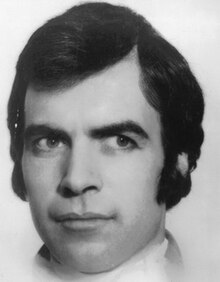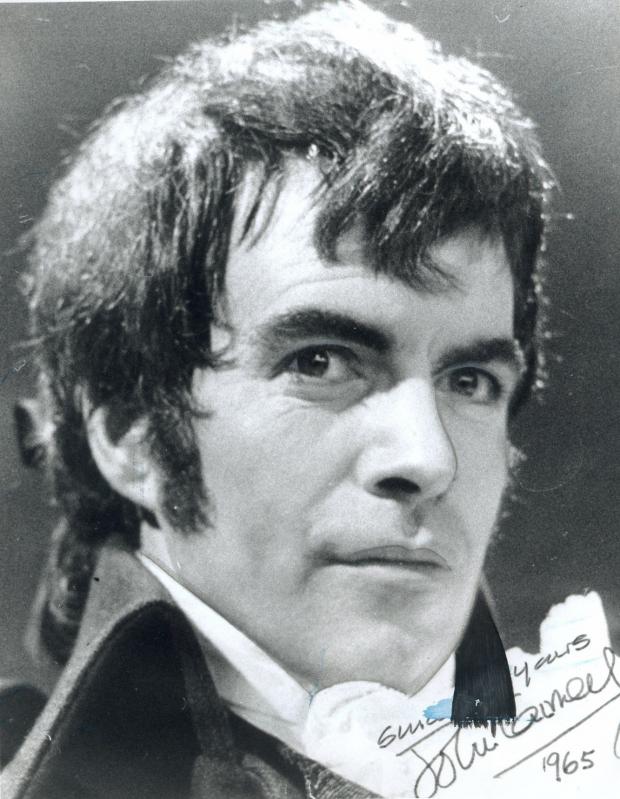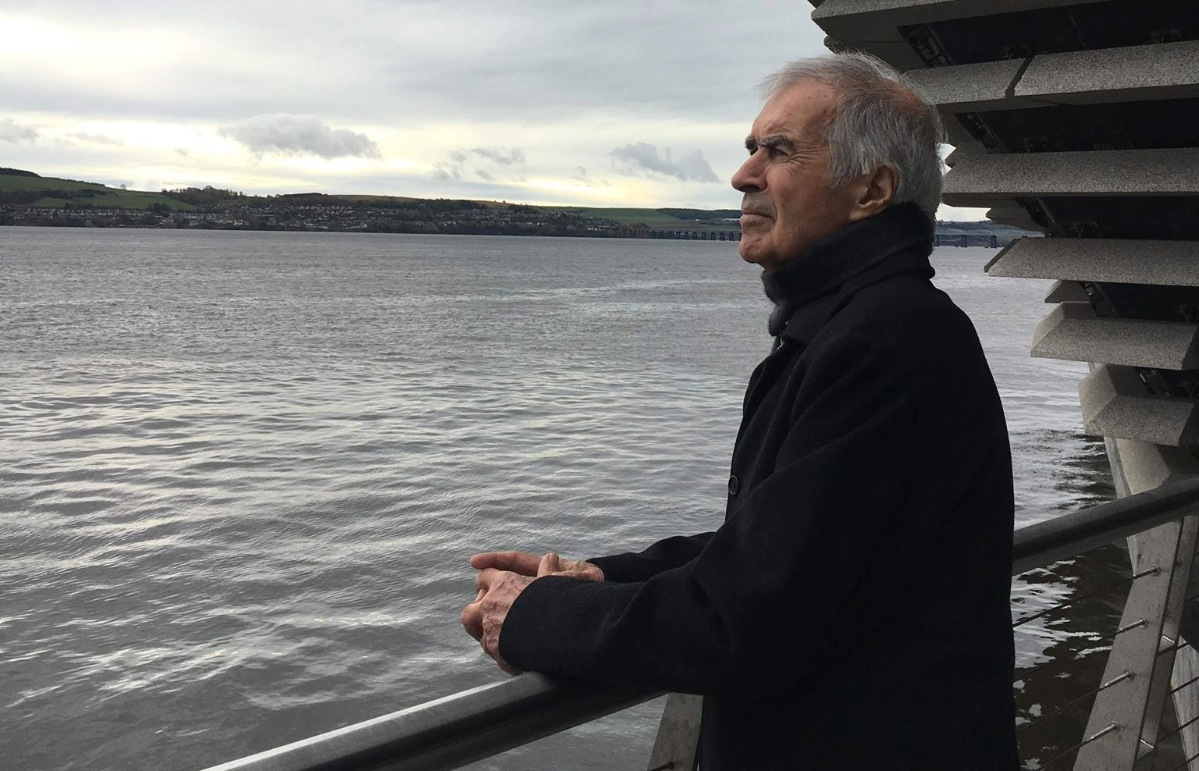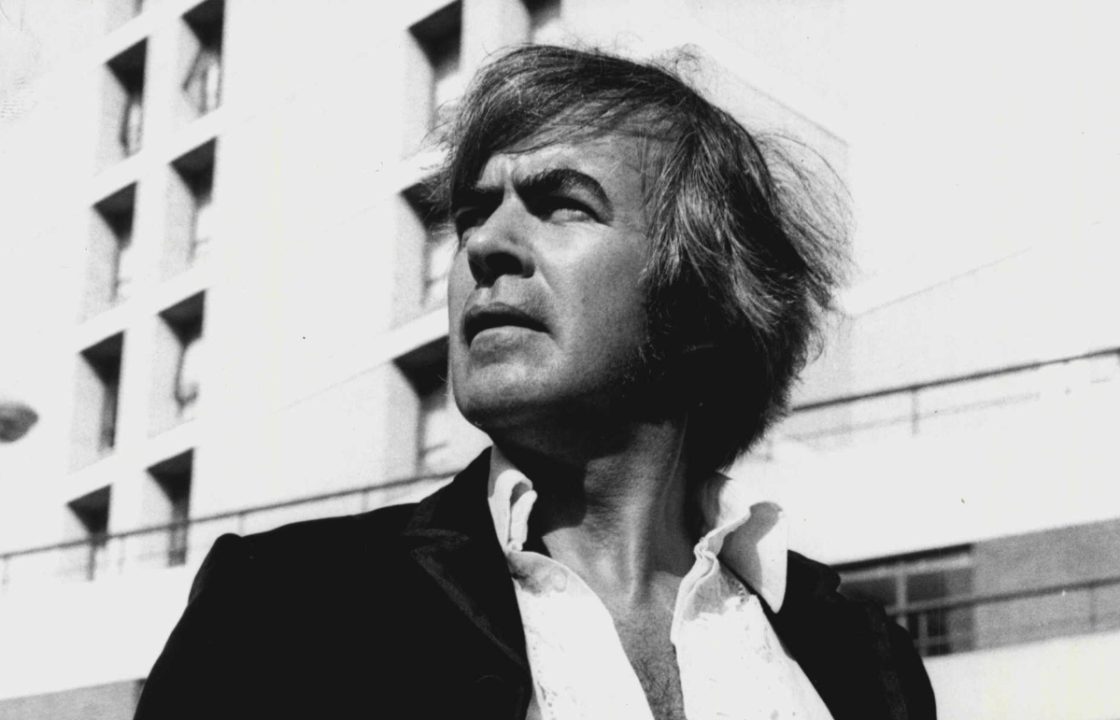| Supporters Homepage |
Details
Full name: John Cairney
Born: 16 February 1930
Died: 7 September 2023
Birthplace: Glasgow
Occupation: Actor, writer
Link: Actors & Celebrity Celtic Fans
Summary
[…]
Links
Books
- The Sevenpenny Gate: A Lifelong Love Affair with Celtic FC – John Cairney (2011)
- Heroes are Forever – The Life and Times of Jimmy McGrory – John Cairney (2005)
Podcast
- Celtic Underground Interview (link needed)
Articles
Scottish actor John Cairney has died aged 93
https://www.bbc.co.uk/news/uk-scotland-66739513
John Cairney as Robert BurnsImage source, Getty Images
Image caption,
John Cairney played Burns on screen and stage
The actor John Cairney, who found fame playing Robert Burns on stage and screen, has died at the age of 93.
The Glasgow-born actor also appeared in the films Jason and the Argonauts and the Titanic drama A Night to Remember.
He trained at the Royal Scottish Academy of Music and Drama (RSAMD) and was a critically acclaimed stage actor before becoming a regular on television and in films.
In later life he became an acclaimed painter.
John Cairney was born in 1930 in the Baillieston area of Glasgow. He briefly attended art college but dropped out to pursue the life of an actor.
After drama school, where he met his first wife Sheila, he began a successful career in the theatre. He was in the British premiere of Arthur Miller’s The Crucible in Bristol and played Hamlet at Glasgow’s Citizens Theatre.
His most famous film role came in 1963’s adventure Jason and The Argonauts, where his character is crushed to death by the living bronze statue, Talos.
Cairney played a revolutionary nationalist in the controversial BBC thriller Scotch on the Rocks
In the 1970s he was the star of the BBC Scotland drama Scotch on the Rocks, in which he played an SNP politician with links to paramilitaries and the Soviet Union.
The series, which was based on a novel by the Conservative politician Douglas Hurd, was considered very controversial and has never been repeated.
Cairney began his long association with Robert Burns when he portrayed the poet in the play There Was A Man at The Traverse Theatre in Edinburgh in 1965. The play was then televised and Cairney recorded an album of the performance.
He would be associated with Burns for the rest of his career, touring the world with his one-man play on the poet. His 1987 autobiography was titled The Man Who Played Burns.
Cairney celebrated other Scottish figures in stage shows about William McGonagall, Robert Louis Stevenson and Charles Rennie Mackintosh.
He lived for many years in New Zealand with his second wife Alannah. The couple moved to Glasgow in 2008, where Cairney returned to the canvas, picking up his paint brushes and finding fresh acclaim for this paintings.
He is survived by Alannah and five children from his first marriage.
A spokesperson for the Royal Conservatoire of Scotland, formerly the RSAMD, said:
“We are so incredibly sad to hear of John Cairney’s death. John was a member of our very first acting programme and was literally first in the classroom door when it opened in 1950.
“Throughout his life he was a passionate advocate for the power of performance and the transformative potential of the arts and arts education. He was a lovely man and will be sorely missed
Obituaries: John Cairney, actor best known for solo performances as Robert Burns
https://www.scotsman.com/news/people/obituaries-john-cairney-actor-best-known-for-solo-performances-as-robert-burns-4341073
John Cairney, actor, writer and artist. Born: Glasgow, 16 February 1930. Died: Glasgow, 6 September 2023, aged 93
By Joyce McMillan
Published 19th Sep 2023, 12:29 BST
Updated 20th Sep 2023, 10:43 BST
0
Comment
With the death of John Cairney, who has passed away peacefully in Glasgow at the age of 93, Scotland marks its last farewell to an actor, writer, artist, film and television celebrity, and dedicated man of the theatre, who became a true Scottish icon of the second half of the 20th century.
John Cairney was a breathtakingly handsome, charismatic and thoughtful actor, best known for his magnificent solo performances as Robert Burns, both on stage and on screen, which began when he first performed Tom Wright’s play There Was A Man at the Traverse Theatre in 1965. His profound creative relationship with Scotland’s national poet – forged across divides of class and religion that made many modern Scots feel that Burns was not for them – arguably helped rescue Burns from a dusty fate as a nostalgic establishment figure; and linked him powerfully with the rebellious mood of social change and liberation that swept the UK in the 1960s.
John Cairney’s career as an actor, though, encompassed many other elements; and by 1965, his rock-star looks and powerful presence had already won him a series of major stage and screen roles, from the Citizens’ Theatre company in Glasgow – where he played Hamlet in a hugely successful 1960 production – to major films including the 1958 Titanic story A Night To Remember, Jason And The Argonauts (1963), and Cleopatra (1963). In 1966-67 he also shot to television fame as idealistic young schoolteacher Ian Craig in the BBC series This Man Craig, set in a 1960s Scottish new town.
John Cairney first played Robert Burns in There was a Man at the Traverse in 1965
John Cairney first played Robert Burns in There was a Man at the Traverse in 1965
Yet after the success of There Was A Man, John Cairney became ever more fascinated by the business of solo live performance, touring the world with shows about Robert Burns, Robert Louis Stevenson and Robert Service, among others; and pursuing an independent course as a writer, producer and performer of his own work, and as the author of 16 published books. It was an unconventional path, for an actor on the brink of a stellar film and television career; but John Cairney was a man of exceptional gifts, and driven to forge a career that matched his own passions and interests, including an ever-evolving relationship with Scotland itself.
John Cairney was born in Baillieston, Glasgow, in 1930, the first child of delivery driver Tom Cairney, and his wife Mary. He had one younger brother, Jim, who became a professional footballer. The family moved to Parkhead in 1931, and the two boys grew up in a big Glasgow Catholic family, strongly aware of its Irish origins. According to his own account of his childhood in his autobiographical book East End To West End, young John was fascinated by the theatre of the mass from an early age, and would try to re-enact the services at home; and his faith remained important to him throughout his life, as did his love for Celtic Football Club.
He was not, though, even slightly deterred by any of the constraints that a young working-class Glasgow Catholic might have experienced, in the highly sectarian culture of the time. “John hadn’t a sectarian bone in his body,” says his friend the writer Gerry McDade, who knew him in the last 15 years of his life. “Just couldn’t be bothered with it at all.”
At school at St. Michael’s Primary and St. Mungo’s Academy, Cairney became ever more fascinated by both art and theatre, and after school, he took up a place at Glasgow School of Art. His course was interrupted by compulsory National Service, which took him to Germany, and to work with the entertainment corps; and on his return to Glasgow in 1950 he was literally “first in the door” when the then Royal Scottish Academy of Music And Drama launched its first-ever acting course, that autumn.
At the RSAMD, Cairney also met Sheila Cowan, whom he married in 1954. The Cairneys had four daughters and a son, and lived near London in the 1950s and ’60s, because of the demands of John’s stage and screen career. It was Sheila’s father Willie, though – a Fife miner whom Cairney greatly admired – who, in 1959, first gave him the volume of Burns poems that triggered his interest in the poet; and as John’s relationship with Scotland’s cultural story became more intense, and the family came back to live in Fife, the pressures of John’s decision to pursue a solo touring career, about which Sheila always had doubts, meant increasingly long periods away from home.
The couple finally divorced in 1980; and later that year, John Cairney married Alannah O’Sullivan, a New Zealand actress, writer and singer who first won fame in her homeland as part of a family group – with her six sisters – known as The Singing O’Sullivans. Like Cairney, she came from a big family with strong Irish roots; and over 43 years, the two built a hugely warm and successful personal and professional partnership.
In 1990, the couple moved to New Zealand, where John – who had already been awarded a M. Litt. from Glasgow University – won a Ph.D. from Victoria University, Wellington, at the age of 64, for a study of Robert Louis Stevenson and theatre. In his later career, he was much in demand as a speaker, performer, writer, consultant and lecturer; and after the couple returned to Scotland in 2008, he also increasingly returned to his first love of painting, creating – among other commissions – a series of stations of the cross titled A Glasgow Calvary, for St. Peter’s Church in Glasgow.
His return to Glasgow, though, also gave John Cairney the chance – in his final years – to enjoy the life of his family, and to spend more time with his grandchildren and great-grandchildren, in whom he took a deep and loving interest. “John was an encourager,” says the actor and director John Bett, who cast Cairney as Macbeth in Richard Demarco’s remarkable 1989 scratch production of the play, staged on the rain-swept island of Inchcolm in the Forth.
“He was a famous man, a real celebrity, and I had no idea how he would react to this last-minute chance to play Macbeth in what were frankly pretty terrible conditions. But he absolutely loved it; and what I learned about him was that his charm and charisma were absolutely real, not a surface thing. He truly cared about people; and I guess he wanted everyone to have the kind of creative life that he had succeeded in making for himself.”
John Cairney is survived by his wife Alannah, by his five children, nine grandchildren, and seven great-grandchildren. And he will also be remembered across Scotland as a rare, beautiful and gifted free spirit of a man, who helped to transform his country by using his tremendous, restless theatrical talent to create work that would link Scotland’s literary history to its ever-changing present; and ensure that those great creative spirits of the past could live and speak again, in our time.
Obituaries
John Cairney obituary: Glasgow star of stage and screen
8th September
https://www.heraldscotland.com/business_hq/23776232.john-cairney-obituary-glasgow-star-stage-screen/
Actor and writer John Cairney, known for his portrayal of Robert Burns and pivotal role at the Edinburgh Fringe festival has died at the age of 93.
An extraordinarily vivid character and a uniquely talented performer, he forged a successful and influential career in the arts from the unlikely beginnings of Parkhead in Glasgow.
Born on 16 February 1930 in Baillieston to Thomas Cairney and Mary Coyle, with his brother, Jim, becoming a professional footballer.
Though he was a lifelong devotee of Celtic – for whom his brother made four appearances – it was the stage rather than the pitch which called to Mr Cairney.
He trained at the Royal Scottish Academy of Music and Drama where he met his first wife, Sheila Cowan. They were married in 1954 and went on to have five children, Jennifer, Alison, Lesley, Jane and Jonathan.
Cairney appeared in the British debut of Arthur Miller’s The Crucible at the Bristol Old Vic in the same year, and became a star of both stage and screen.
Read More: Salute John Cairney, a man for all seasons
His performances as Hamlet in his native Glasgow were so popular that queues would form around the block to see the play at the Citizen’s Theatre.
Cairney appeared in A Night To Remember, the Golden Globe winning film which recounted the sinking of the Titanic, as well as Jason and the Argonauts, Cleopatra and many more.
On stage he played Becket in Murder in the Cathedral at the Edinburgh Festival and, famously, Macbeth, in Richard Demarco’s production on Inchcolm Island.
However, it was with Scotland’s national bard that Cairney was most indelibly associated.
In 1965, he performed a one-man show written by the poet and playwright, Tom Wright in which he recited the works for Robert Burns for over three hours.
While it wasn’t the first solo show to be performed at the Fringe, his masterful take is credited with carving out a space for literature at the festival which endures to this day.
Presented at the Traverse Theatre for a one-week trial run, There Was A Man ran for two months due to the phenomenal demand for tickets and was named by Playbill as one of the most pivotal moment’s in the festival’s history.
The show was televised twice and recorded as a best selling album, and Cairney would be associated with Burns for the rest of his career.
The Herald: John Cairney as Robert Burns
In 1968 he wrote and starred in a six-week television adaptation of the Robert Burns Story for STV, wrote a screenplay for a film which ultimately went unmade and organised the first ever Burns Festival in Ayr, near the bard’s birthplace of Alloway.
His television work included the serial This Man Craig, Elizabeth R, Dr Finlay’s Casebook and Jackanory, among others.
As he performed less, Cairney returned to an early love of painting, enjoying considerable success as an artist with several prestigious commissions and successful exhibitions.
In 1980 he married New Zealand actor Alannah O’Sullivan, with the pair subsequently spending 18 years in her homeland.
They enjoyed a long and very happy marriage as well as performing regularly on stage together.
Throughout his long life and alongside his many creative adventures, classical music and the Catholic Church were constants and both brought great comfort. Also long standing were his relationships with a wide circle of friends, in Scotland, New Zealand and around the world, many of whom had been trusted allies since boyhood.
The freedom of the career he had created was important to Cairney but he also loved the company of a ‘good table’ and he would attempt the harmony to every tune he ever heard. His family like to think of him in his study, a glass of red poured and a pot of minestrone bubbling away for lunch. Verdi on the radio, Alannah by his side, a good pen in his hand and, in front of him, a pristine sheet of white paper.
An incredibly gifted performer, blessed with magnetism, looks, charm and sheer talent, he was never happier than when, having given his best on stage, he received the ultimate mark of appreciation from the audience: a moment of perfect silence.
He is survived by second wife Alannah O’Sullivan, children Jennifer, Alison, Lesley, Jane and Jonathan, nine grandchildren and seven great grandchildren.
Legendary Glasgow-born actor John Cairney has died
7th September
https://www.glasgowtimes.co.uk/entertainment/tv_radio/23775006.legendary-glasgow-born-actor-john-cairney-died/
Legendary Glasgow-born actor John Cairney has died at the age of 93, according to the BBC.
The Scots star who found fame by playing Robert Burns on stage and screen was born in 1930 in the Baillieston area of the city.
John appeared in the films Jason and the Argonauts and the Titanic Drama – A Night to Remember, as well as also appearing in BBC Scotland drama Scotch on the Rocks.
Glasgow Times:
Originally, he trained at the Royal Scottish Academy of Music and Drama and was a stage actor before moving to television and films.
He briefly also attended art college but dropped out to pursue the life of an actor.
John also played a part in the British premiere of Arthur Miller’s The Crucible in Bristol and played Hamlet’s at Glasgow Citizens theatre.
The Glasgow actor’s long association with the poet Robert Burns started when he portrayed him in the play There Was A Man at The Traverse Theatre in Edinburgh in the mid-1960s.
Glasgow Times:
He then became associated with the popular Scots poet for the rest of his career, touring the world with his one-man play on Robert Burns.
During his life, he moved across the world to New Zealand with his second wife however, the couple moved back to his hometown at the turn of the century where he started painting.
Tributes have flocked in for the star on social media after his passing.
Glasgow Times:
One Facebook user said: “Saddened to learn of the death of my friend John Cairney. One of Scotland’s most talented actors – he was delightful company, and we spent many entertaining times together.”
Another said: “I’m sorry to learn that we have lost wonderful actor, John Cairney.
“Not only a great actor, but John was also a singer, a writer, and a painter. What a gifted man. Definitely a life well lived. RIP.”
While an X (formerly known as Twitter user) said: “Met him a couple of times; nice guy. RIP John Cairney.”
Another added: “Very sad to hear of the passing of John Cairney.
“I can remember watching him on Quiz Ball as part of the successful Celtic team when I was a youngster.
“May he rest in eternal peace.”
Meanwhile, another user said: “RIP sir.”
Glasgow Times:
The Royal Conservatoire of Scotland (RCS), formerly the RSAMD, said they are also “incredibly” sad to hear the news.
They said: “We are so incredibly sad to hear of John Cairney’s death. John was a member of our very first acting programme and was literally first in the classroom door when it opened in 1950.
Glasgow Times:
“Throughout his life he was a passionate advocate for the power of performance and the transformative potential of the arts and arts education. He was a lovely man and will be sorely missed.”
John Cairney was a true lad o’ pairts – he gave so much to our culture
The Glasgow-born actor and writer built a prodigious legacy over half a century that will resonate long after his passing.
Bernard Ponsonby: John Cairney was a true lad o’ pairts – he gave so much to our culture Getty Images
Scottish-born actor and writer John Cairney, who died aged 93 on September 7.
Share via
https://news.stv.tv/entertainment/bernard-ponsonby-john-cairney-was-a-true-lad-o-pairts-he-gave-so-much-to-our-culture
On Saturday, August 10 2019, at Queen’s Park Church of Scotland, the doyen of Scottish sports broadcasters Archie Macpherson, was giving a marvellous account of the career of recently departed Celtic legend, Billy McNeill.
The event was part of the Govanhill book festival, and it was standing room only as Macpherson delivered his observations with a wordsmiths elan and a verbal panache that had his audience engrossed.
During the questions, right at the back of the room, a series of observations were made in such beautifully modulated tones that they were listened to with great respect.
I turned to Archie and said ‘that’s John Cairney’. The actor was in his late 80s at this point but with a ball boy’s enthusiasm for the subject matter, he spoke with a heavy affection about Glasgow’s Green and White.
This was unsurprising; for the actor and writer had himself penned an evocative love letter on Celtic’s greatest ever goal scorer, ‘Heroes are Forever’ The Life and Times of Jimmy McGrory. It was published by Mainstream in 2005.
For an older generation of Scots, he is a household name who has left behind a legacy of work on stage, film, television and in writing which celebrates some of the key literary and enlightenment figures of his native land.
To call that body of work prodigious, is to understate his contribution to the cultural topography of this nation.
To stage and television we must add author, recitalist, lecturer, director, painter and consultant. He was a lad o pairts and they were many and varied.
His artistic contribution may have started in Scotland, but he won international acclaim through a succession of one-man shows on Robert Burns, Robert Lous Stevenson, Charles Rennie Mackintosh and William McGonagall.
Born in Glasgow on February 16 1930, he made his stage debut at the Park Theatre, Glasgow in 1947 before enrolling at the then Royal Scottish Academy of Music and Drama.
What followed was a career that lasted more than half a century. His stage, film and television appearances are simply too numerous to list but much of his contribution centred on the lives of celebrated Scots.
Advertisement
His first association with Burns came in 1965 with the solo play ‘There Was A Man’ at the Traverse Theatre in Edinburgh. He starred in ‘Burns’ a series of six programmes he made for STV in 1968.
The broadcaster Tony Currie, said today that he was saddened to learn of the death of his friend. Currie said that Cairney was delightful company who would be missed particularly in the Glasgow Art Club.
Mr Currie said ‘although probably best known for his many portrayals of Robert Burns, he starred in his own TV series, ‘This Man Craig’ which was made in Glasgow for the brand new BBC-2 in 1966-67 and for which he played a Glasgow schoolteacher’.
Indeed, ‘This Man Craig’ ran for 52 episodes and made Cairney a household name in part no doubt because of his striking good looks.
These never managed however to distract from the brilliance of his performances and he won critical acclaim for his work.
He had a stage and screen presence which managed to be both natural and imposing. His first film ‘Ill met by Moonlight’ was for the Rank Organisation in 1957. He would go on to star in 15 other films.
He authored over 15 books and, wrote for the theatre and scripts for television and radio. Much of his work was collaborative with his second wife, the actor and scriptwriter Alannah 0’Sullivan.
John Cairney gained a Phd from Victoria University in Wellington, New Zealand. Such was the breadth of the work of this man of letters that no doubt someone asked him, ‘Dr Cairney, I presume?’
The website of Dr Cairney and his New Zealand-born wife is an impressive and meticulous narration of lives spent devoted to the power of art to move and say something about the world in which we live. This website is in a sense a memorial and the welcome message says something of their views on artistic endeavour.
They wrote ‘ours is a world of storytelling by way of acting and writing, presented on stage, radio, television, film or between the covers of a book. Creativity is all.
‘It has taken us not only to the very edges of our imaginations, but from one end of the earth to the other playing shows in Wick in Scotland to Invercargill in New Zealand-and all the places in between. It’s a lifetime’s journey’.
That journey is now at land’s end, but it will live on in the experiences of those who will continue to be impressed by a master of several crafts – a man who gave so much and whose work will resonate long after his passing.


